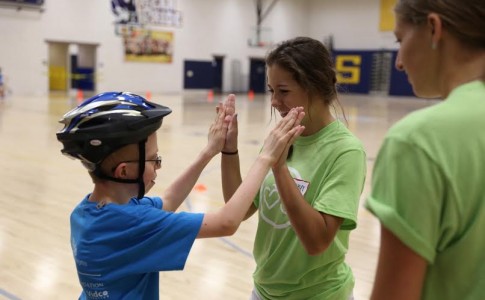My daughter had her first seizure when she was four weeks old. Within two weeks she was having clusters of several seizures a couple of times a day. I have never felt so helpless … and desperate. My husband and I took her to the emergency room at the local children’s hospital hoping that we would receive answers, medications and control. We left after a few days with a medication to try, no answers and feeling like things were totally out of our control. I remember thinking that I was so grateful to have a children’s hospital so close, but not wanting to ever have to go back. Little did I know that this was the beginning of a long love/hate relationship with that hospital.
Everything I knew about babies (and I know a lot) was thrown out the window. I felt that if we could get control of the seizures then she would be just fine. Her seizures continued and the gap between where she should be developmentally and where she actually was kept getting bigger.
I found myself at the end of the day (actually at the end of a lot of days) thinking that there was no way I could wake up and do this again. There were times when I told my husband I just needed to hit something. I finally bought myself a punching bag so I could have something to hit! I was angry, just simply angry.
I spent plenty of nights searching on the internet for answers of what could possibly be going on with my baby girl and end up frustrated because I couldn’t find any answers. All of the information was starting to look the same, and still no answers. I looked back at my pregnancy to see what I may have done wrong. Was it the amusement ride that I went on when I was 3 months pregnant? Or did something happen when I fell down a couple of steps? Or did my helping a friend paint a room while I was pregnant cause her seizures?
There were other times when I felt that if I could just find the right medication, the right treatment, provide the right amount of therapies, find the right diet, I could make her better. And then I would hit rock bottom and would barely have the energy to get out of bed and take care of her, let alone my other children. I would have to take my days a half a day at a time, even one hour at a time, to get through. It was a crazy ride. But, I did make it through.
I found the things that helped me get through the moments, hours and days were:
- sleep (which is hard when your mind has a hard time turning off or your baby has a hard time sleeping)
- exercise (having a punching bag or a good pair of walking shoes can do wonders for working off a bunch of emotions)
- talking (with my husband, friend or a parent who was ahead of me in the grief process)
- filling my bucket (easier said than done, but even 10-15 minutes of doing something for yourself can make a huge difference in your being able to face the day-to-day challenges of taking care of a child with special needs)
- turning to a higher power (meditating, prayer, mindfulness)
- knowledge (learning what you can about your child’s diagnosis, community resources, etc.)
It wasn’t until a couple of years after my daughter’s birth that I was able to look back at those early days with her and realize that I was experiencing grief, oftentimes harsh and brutal, lonely and isolating grief. Gradually I connected with new friends who also had children with special needs who could validate what I was going through. I came to the realization that I wasn’t alone in my feelings, which took a huge weight off my shoulders.
There are many emotions that surface when you have a child with special needs, whether you find out that your child may have a disability before they are born, notice that they are not developing as a typical infant or toddler should, or discovering a learning disability or some other special need in their early school years. These emotions are normal. You may not recognize them while you are experiencing them, or are in “survival mode,” but they are normal.
Whenever a diagnosis comes, it is important to recognize and go through the feelings of grief. Grieving is a spontaneous and unlearned process. Even though there are specific stages of grief, everyone responds differently. All of the reactions and feelings are normal and they serve an important function. A parent or family member may feel any of these emotions in any sequence or all at once. It is very important to recognize:
- what these feelings are,
- the purpose or benefit that comes from experiencing the emotion,
- how these reactions impact you as an individual and the people around you, and\
- how important it is to share your feelings with people that are important to you.
The stages of grief, what they look like and their purpose are:
Denial:
Looks like: confusion, numbness, forgetfulness.
Purpose: makes time for individuals to find their internal strengths and the external supports to deal with what is happening.
Anxiety:
Looks like: feeling scared, worried, jumpy.
Purpose: helps mobilize and focus energy to make needed changes.
Guilt:
Looks like: blaming, remorse, shame, self-reproach.
Purpose: allows individuals time to examine the question of what impact (significance or meaning) their feelings, behavior and thoughts have on the important things around them or their environment.
Anger:
Looks like: desire to blame someone or something; when sustaining a loss, a sense of unfairness surfaces; sometimes it is displaced – often on those parents who need the most support.
Purpose: impels individuals to explore issues and values.
Fear:
Looks like: a desire to hold child close and keep them safe; brings about questions concerning the child’s future.
Purpose: the outer perimeter that one must cross to commit to changing. It allows individuals to deal with issues of vulnerability, desertion and attachment. It is a mechanism to permit someone to attach again.
Bargaining:
Looks like: negotiating, haggling, looking for alternatives, bartering making a “deal.”
Purpose: permits individuals to find ways to help justify and rationalize the way they are feeling.
Depression:
Looks like: problems eating or sleeping, loss of interest in everything; sadness; lack of energy; feelings of helplessness; desire to be left alone; withdrawal, can’t get to bed.
Purpose: permits individuals to reexamine their definitions and come to new definitions of competency, capability, value and effectiveness and to view the world in less severe, critical, perfectionist ways in light of the loss.
The stages of grief are natural and normal. They are not experienced in any predictable order, they are more like a roller coaster ride than an actual cycle or circle. The emotions of grief can resurface at any time, often triggered by unmet developmental milestones, setbacks or for no reason at all.
“It’s important to expect a roller coaster ride. Remember as you ride you are going to come to loops and twists; enjoy the good times, but don’t be surprised by the bad. Where you are isn’t where you are going to stay.” (www.dfwchild.com)
It is important to give yourself “permission” to let yourself grieve. It is important to remind yourself that you will work through your emotions. And, it is important to know that is okay to get help if you are unable to work through or get stuck on the grief “roller coaster.”
But, remember, it is important to recognize what the stages or feelings of grief are, the purpose or benefit that comes from experiencing the emotion, understand how these reactions impact you as an individual and the people around you, and how important it is to take care of yourself as you are taking care of your child with special needs.
Helpful Online Resources:
www.parentcenterhub.org/repository/notalone/
www.medicalhomeportal.org/living-with-child/after-a-diagnosis-or-problem-is-identified
www.pent.ca.gov/beh/dis/parentstruggle_DK.pdf
www.specialeducationadvisor.com/the-stages-of-grief-in-learning-your-child-has-special-needs/
www.caregiversconnect.sg/content/five-stages-grief
www.utahparentcenter.org





No comments